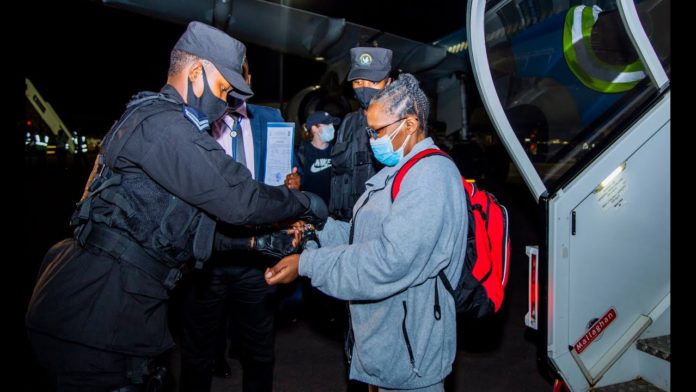By The Rwandan Lawyer
1.Factual situation
A woman who served a 10-year sentence in U.S. prison for lying about her role in the 1994 Rwandan genocide to obtain American citizenship and lost her bid for a new trial has been deported to Rwanda, her lawyer said Saturday. Beatrice Munyenyezi was convicted and sentenced in 2013 in the U.S. state of New Hampshire. She served a 10-year sentence in the state of Alabama and had faced deportation. She lost her latest court battle in March, when the 1st U.S. Circuit Court of Appeals upheld a federal district judge’s rejection of her petition challenging how the jury was instructed during her trial in federal court in New Hampshire.”Yes, that did happen,” her lawyer, Richard Guerriero, wrote in an email Saturday when asked whether Munyenyezi had been deported to Rwanda. He said he believed she arrived in Kigali, the Rwandan capital, on Friday April 16, 2021. Munyenyezi was convicted of lying about her role as a commander of one of the notorious roadblocks where Tutsis were singled out for slaughter. She denied affiliation with any political party, despite her husband’s leadership role in the extremist Hutu militia party. She requested a new trial based on a 2017 U.S. Supreme Court decision limiting the government’s ability to strip citizenship from immigrants who lied during the naturalization process. Munyenyezi alleged that the jury was given inaccurate instructions on her criminal liability. A judge denied her request, saying that even if the instruction fell short, the error was harmless beyond a reasonable doubt. As part of her appeal, Munyenyezi’s trial lawyers, who are now New Hampshire superior court judges, said in court documents that they would have presented Munyenyezi’s case differently if the U.S. Supreme Court decision had been law during her trial. They added that they believe if the jury had instructed based on the court decision, “the verdict may have been different.” At the time, her lawyers portrayed her as the victim of lies by Rwandan witnesses who had never before implicated her through nearly two decades of investigations and trials, even when testifying against her husband and his mother before the International Criminal Tribunal on Rwanda.
U.S. prosecutors said that Munyenyezi wasn’t entitled to a new trial and could have raised a similar legal argument at the time because it had come up in other cases. But her defense lawyers said they were not aware that other lawyers had raised the issue. In the 2017 U.S. Supreme Court case, a Serb who emigrated from Bosnia to the United States lied about the reasons she feared persecution, her husband’s service in the Bosnian Army, and his role in the slaughter of thousands of Bosnian Muslim civilians. She asked that the jury be instructed that her citizenship could be stripped if the government proved that her lies had influenced the decision to grant her citizenship. A court declined to do that, but the Supreme Court reversed that decision.
2.Analysis
the case of this woman recently extradited raises a series of interrogations in terms of the fair nature of the judgment she is expecting from Rwandan courts.
2.1.Delation victim
The charges against this woman are cooked on the consideration that she is the spouse of Shalom Ntahobari and daughter in law of Nyiramasuhuko Pauline who are now jailed for their respective roles in the genocide of 1994.
The ministry of justice in connection with the public prosecution authority organize charging testimonies through the service in charge of protection of victims and witnesses and those testimonies are retained by witnesses prepared especially from ancient militia sentenced ancient rebellion officers who are entitled to be more convincing than civilians if there is cases involving ancient military officers or militias.
Witnesses stating that this woman was on roadblocks are just prepared from students who were attending with her and when we interacted with others who were not contracted by the public prosecution service in charge of protection of witnesses and victims, the latter unveiled that it is matter of delation plotted against this woman.
2.2.Individual liability
As per article 14 of the international covenant on civil and political rights of 16 December 1966 with entry into force 23 March 1976, in the determination of any criminal charge against him, everyone shall be entitled to the following minimum guarantees, in full equality: to be tried in his presence, and to defend himself in person or through legal assistance of his own choosing; to be informed, if he does not have legal assistance, of this right; and to have legal assistance assigned to him, in any case where the interests of justice so require, and without payment by him in any such case if he does not have sufficient means to pay for it; and to examine, or have examined, the witnesses against him and to obtain the attendance and examination of witnesses on his behalf under the same conditions as witnesses against him.
The fact of being a relative of someone sentenced does not imply her personal involvement in crimes committed. The challenge not responded is that the US which had condemned her to 10 years for having provided false information about her relationships with Rwanda politicians did not decide to judge her for facts of genocide and extradite her to a country which the same state accused of violations of fundamental rights. Isn’t there a paradoxical option?
Conclusion
Even if this woman is overtly sentenced by the Rwandan government, the resort to the cross-examination enshrined by the provisions of article 14 of the international covenant on civil and political rights and those of article 7 of the African charter on human and people’s rights of 1981 may help her to contradict the false testimonies pre-manufactured. The remaining issue is the reliability of the court which is already politicized.
































































